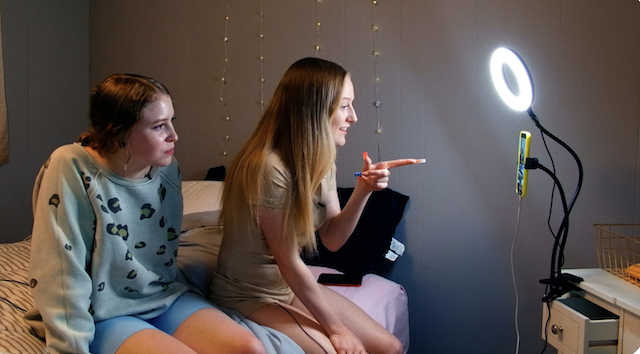
©Courtesy of Sundance Film Festival
The dedicated obsession many young adults develop to social media and technology isn’t always just a mindless addiction. The new film, Sugar Babies, is both a deeply personal and broadly resonant documentary. Its story offers a poignant commentary on how young adults, through the lens of its protagonist, Autumn Johnson, can use social media platforms as a way to overcome poverty in America with dignity and grace, particularly on their own terms.
Sugar Babies was directed and produced by famed documentarian Rachel Fleit, who’s known for helming the documentaries Introducing, Selma Blair and Bama Rush. With her latest project, Fleit once again crafted a feature that stands out for its intimate, judgment-free portrayal of an impressively self-aware and ambitious young woman.
Sugar Babies follows Johnson, an enterprising college scholarship recipient and burgeoning TikTok influencer. Part of a close circle of friends growing up poor in rural Louisiana, she is determined to overcome the struggles and barriers that define them. Faced with limited minimum wage job options, Johnson devises an online sugar baby operation.
The key to her business strategy: just talking, flirting, and sharing photos and videos online to get what she wants from her followers, all without meeting the men who give her money. Johnson refuses to be negatively defined by her economic status, instead using her online enterprise to reclaim control and assert power.
As with her previous movies, Fleit crafted a nuanced exploration of identity and belonging through the experiences and backgrounds of her feature’s female protagonists. Along with Sugar Babies‘ editor, Holle Singer, the director skillfully and empathetically illuminated Johnson’s close connections in her tight-knit community in a personable and interesting story.
The young college student and her family and friends express their desire to make more money and rise up out of their dire economic circumstances. Their determination is set against details about the pervasive economic challenges across their small towns in rural Louisiana.
The film explains and humanizes Johnson and her friends’ decisions to ask strangers for money online, as Louisiana doesn’t have a state minimum wage law. Despite the fight by many state officials, including former Gov. John Bel Edwards, to set a higher rate of pay since 2008, state residents are still subjected to only receiving the current Federal minimum wage of $7.25 per hour. As a result, many people in Johnson’s town of Ruston, Lousiana must work at least two or three minimum wage jobs just to barely survive.
Sugar Babies, which takes place over the course of four years, supports Johnson’s determined entrepreneurial spirit to do whatever it takes to earn money to put towards finishing her college degree. However, the documentary’s scant 81-minute runtime doesn’t allow the story to go into much detail about her business practices. Instead, she mainly just discusses how she earns money by teaching other young women how to make hundreds of dollars online every day, or by sending suggestive photos and private messages to strangers online.
The movie’s overall short runtime, which is fueled by minimalist scenes in which Johnson emphasizes that she solicits money online because her area’s lack of employment opportunities keep her on the wrong side of class lines, mainly prioritize sensationalistic details over objective, journalistic ones. She implies she doesn’t feel guilty about scamming the men she speaks to online by not always following through on her promises or by creating a fake persona because she doesn’t feel comfortable with her upper class fellow students at Louisiana Tech University.
Sugar Babies is an intimate character study of Johnson as a vulnerable and poignant representative of young women who learn to use the hyperrealism of social media to advance their economic opportunities in a stagnant economy. While her solution to the crisis may initially seem to be ill-advised, she ultimately proves she can use her street smarts and tough attitude to her advantage.
While the film supports Johnson’s determined entrepreneurial spirit to do whatever it takes to earn money to improve her life, at times it avoids exploring and answering straightforward, context-setting questions into her and her family’s lives. The documentary doesn’t share such information as how much money Johnson is making from her life as an influencer and interactions tend to be like with her clients; instead, her online presence is mainly shown through split screen, atmospheric selfie montages.
Sociopolitical context, meanwhile, is presented via jarring insertions of factual title cards and newscast footage. The news clips of former Louisiana Governor Bel Edwards’ repeatedly rebuffed efforts to raise the state’s minimum wage runs parallel to Johnson’s story and reflects her personal struggles. However, it remains disjointed from the protagonist’s main story, as she never discusses the subject directly, even though it defines her struggles.
Despite Sugar Babies‘ at-times disjointed nature, the feature’s overall story arc proves that Johnson refuses to be defined by her economic status. She feels confident in her decision to earn money through her online enterprise, as she feels it allows her reclaim control in a struggling society that thwarts the voices of both the poor and the women who never had power before.
Overall: B
Sugar Babies had its World Premiere in the U.S. Documentary Competition at this year’s Sundance Film Festival.
If you like the review, share your thoughts below!
Check out more of Karen Benardello’s articles.

